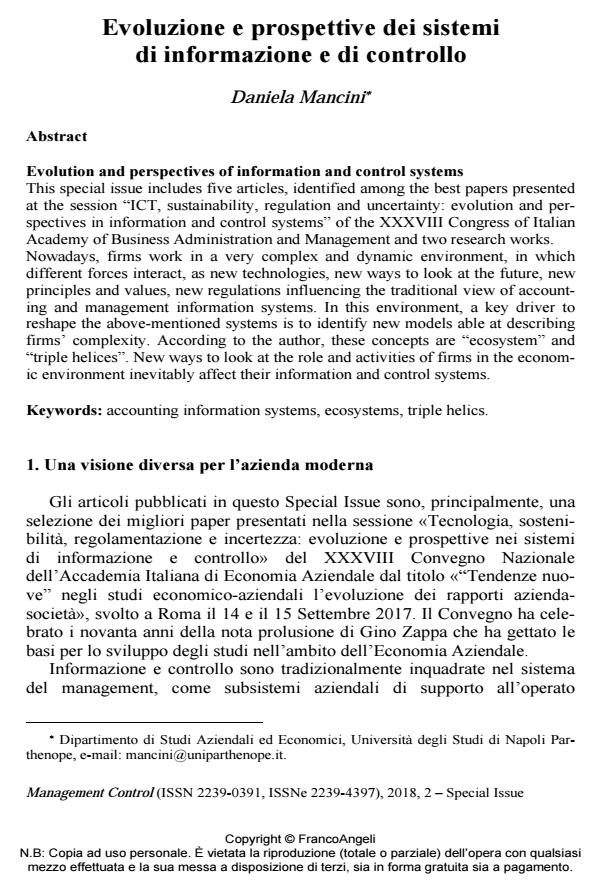Evolution and perspectives of information and control systems
Journal title MANAGEMENT CONTROL
Author/s Daniela Mancini
Publishing Year 2018 Issue 2018/2 Suppl.
Language Italian Pages 10 P. 5-14 File size 167 KB
DOI 10.3280/MACO2018-SU2001
DOI is like a bar code for intellectual property: to have more infomation
click here

FrancoAngeli is member of Publishers International Linking Association, Inc (PILA), a not-for-profit association which run the CrossRef service enabling links to and from online scholarly content.
This special issue includes five articles, identified among the best papers presented at the session "ICT, sustainability, regulation and uncertainty: evolution and per-spectives in information and control systems" of the XXXVIII Congress of Italian Academy of Business Administration and Management and two research works. Nowadays, firms work in a very complex and dynamic environment, in which different forces interact, as new technologies, new ways to look at the future, new principles and values, new regulations influencing the traditional view of accounting and management information systems. In this environment, a key driver to reshape the above-mentioned systems is to identify new models able at describing firms’ complexity. According to the author, these concepts are "ecosystem" and "triple helices". New ways to look at the role and activities of firms in the economic environment inevitably affect their information and control systems.
Keywords: Accounting information systems, ecosystems, triple helics
- Aarikka-Stenroosa L., Ritalab P. (2017), Network management in the era of ecosystems: Systematic review and management framework, Industrial Marketing Management, 67, pp. 23-36.
- Amigoni F. (1988), I sistemi di controllo: criteri di progettazione, in Amigoni F. (a cura di), Misurazioni d’azienda, Milano, Giuffrè.
- Arnaboldi M., Busco C., Cuganesan S. (2017), Accounting, accountabilty, social media and big data: revolution or hype?, Accounting, Auditing & Accountability Journal, 30, 4, pp. 762-776. DOI: 10.1108/AAAJ-03-2017-2880
- Bertini U. (1990), Il sistema d’azienda, Torino, Giappichelli.
- Cai Y., Cui Liu C. (2015), The roles of universities in fostering knowledge-intensive clusters in Chinese regional innovation systems, Science and Public Policy, 42, pp. 15-29
- Ceccherelli A., Introduzione allo studio della ragioneria generale. Gli organismi aziendali, Firenze, Le Monnier.
- Etzkowitz H., Zhou C. (2006), Triple Helix twins: innovation and sustainability, Science and Public Policy, 33, 1, February, 77-83. DOI: 10.3152/147154306781779154
- Graça P., Camarinha-Matos L.M. (2017), Performance indicators for collaborative business ecosystems – Literature review and trends, Technological Forecasting & Social Change, 116, pp. 237-255.
- Lamboglia R., Mancini D., Piedepalumbo P. (2016), New Business Model for Value Cocreation in Smarter Universities, in Marchi L., Lombardi R., Anselmi L., Il governo aziendale tra tradizione e innovazione, Milano, FrancoAngeli.
- Mancini D., L’azienda un tema ancora aperto. Alcune considerazioni sulla concezione di azienda di Alberto Ceccherelli alla luce delle teorie organicista e cognitiva, Rivista Italiana di Ragioneria e di Economia Aziendale, 9/10.
- Marchi L. (2003), I sistemi informativi aziendali, Milano, Giuffrè.
- Moore J.F. (1993), Predator and Pray. A New Ecology of Competition, Harvard Business Review, May-June.
- Moore J.F. (2013), Shared Purpose: A Thousand Business Ecosystems, a Worldwide Connected Community, and the Future, -- retrieved https://www.arm.com/files/pdf/Shared_Purpose.pdf.
- Digital Open Innovation for Sustainability: Evidence From Italian Big Energy Corporations Pasquale Del Vecchio, Giustina Secundo, Antonello Garzoni, in IEEE Transactions on Engineering Management /2024 pp.8430
DOI: 10.1109/TEM.2024.3390207 - Crisis and controls: the Italian model Roberta Provasi, Patrizia Lucia Maria Riva, in Corporate Ownership and Control /2013 pp.423
DOI: 10.22495/cocv11i1c4art6 - L'azienda intelligente: opportunità e minacce per la creazione di valore Claudia Presti, in MANAGEMENT CONTROL 3/2022 pp.5
DOI: 10.3280/MACO2022-003001 - From cost control to cost management: How is the current state of the Italian context? Anna Lucia Missaglia, Alberto Bubbio, Dario Gulino, in MANAGEMENT CONTROL 1/2024 pp.203
DOI: 10.3280/MACO2024-001010 - Organizing Smart Buildings and Cities Véronique Flambard, Nicolas Gouvy, J. Jacques, Elisabetta Magnaghi, D. Mancini, pp.1 (ISBN:978-3-030-60606-0)
- How Smart Technologies Affect the Decision-Making and Control System of Food and Beverage Companies—A Case Study Domenica Lavorato, Palmira Piedepalumbo, in Sustainability /2023 pp.4292
DOI: 10.3390/su15054292 - The moderating effect of corporate size on the relationship between prospector strategy and management accounting practices Federica Palazzi, Francesca Sgrò, Massimo Ciambotti, Nick Bontis, Lorenzo Gelsomini, in Journal of Management Control /2023 pp.135
DOI: 10.1007/s00187-023-00353-2 - Corporate social responsibility and stock prices: A study on the Italian market Giovanni Fiori, Francesca di Donato, Maria Federica Izzo, in Corporate Ownership and Control /2015 pp.600
DOI: 10.22495/cocv12i2c6p3 - Gestione integrata dei dati e performance aziendali Antonella Paolini, in MANAGEMENT CONTROL 2/2022 pp.5
DOI: 10.3280/MACO2022-002001 - Open Innovation for sustainable transition: The case of Enel “Open Power” Stella Lippolis, Angelo Ruggieri, Rossella Leopizzi, in Business Strategy and the Environment /2023 pp.4202
DOI: 10.1002/bse.3361
Daniela Mancini, Evoluzione e prospettive dei sistemi di informazione e di controllo in "MANAGEMENT CONTROL" 2 Suppl./2018, pp 5-14, DOI: 10.3280/MACO2018-SU2001